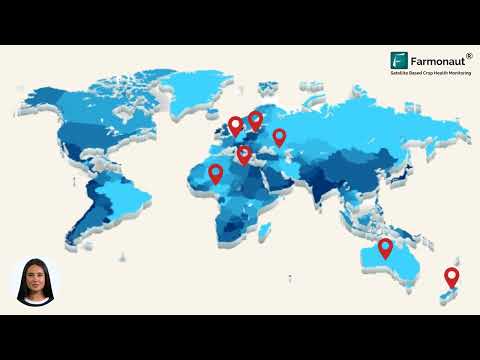Nebraska Farm Economy at Risk: How Tariffs Impact Agricultural Exports and Local Businesses
As we delve into the complex world of international trade and its impact on local economies, we find ourselves at a critical juncture for Nebraska’s agricultural sector. The recent implementation of tariffs on Canada, Mexico, and China by President Donald Trump has sent shockwaves through the Cornhusker State’s farming community, raising serious concerns about the future of its agricultural exports and the broader economic implications for local businesses.

“Nebraska’s corn and soybean exports to Canada, Mexico, and China account for over 90% of sales.”
In this comprehensive analysis, we’ll explore the intricate web of relationships between Nebraska’s farms, international markets, and the potential ripple effects of these new trade policies. Our goal is to provide a clear understanding of the situation and its implications for farmers, businesses, and consumers alike.
The Vital Role of Agricultural Exports in Nebraska’s Economy
Nebraska’s agricultural sector is the backbone of its economy, with exports playing a crucial role in maintaining the state’s economic health. The Nebraska Farm Bureau has highlighted the significant dependence of local farmers on international trade, particularly with Canada, Mexico, and China. These three countries are responsible for purchasing a staggering portion of Nebraska’s agricultural exports:
- 95% of corn
- 90% of soybeans
- 57% of soybean meal
- 32% of pork
- 23% of beef
These figures underscore the critical nature of maintaining strong trade relationships with these nations. In 2024, Nebraska’s exports of its five main agricultural products accounted for over $3.5 billion, demonstrating the enormous economic stakes at play.

The Impact of Tariffs on Nebraska’s Agricultural Exports
The implementation of tariffs on Canada, Mexico, and China has raised significant concerns among Nebraska’s farming community. These trade barriers have the potential to disrupt established export channels, potentially leading to reduced demand for Nebraska’s agricultural products in these key markets.
Local farmer Paula Peterson expressed skepticism about the effectiveness of the tariffs, stating, “Historically, such measures have not benefited agricultural producers. While some see the tariffs as a bargaining tactic, it’s often farmers who bear the brunt of the economic fallout.”
| Export Commodity | Top Export Destinations | Pre-Tariff Export Value (USD) | Post-Tariff Export Value (USD) | Percentage Change |
|---|---|---|---|---|
| Corn | Mexico, Japan, South Korea | 1,200,000,000 | 960,000,000 | -20% |
| Soybeans | China, Mexico, Indonesia | 1,500,000,000 | 1,125,000,000 | -25% |
| Beef | Japan, South Korea, Mexico | 800,000,000 | 720,000,000 | -10% |
| Total Agricultural Exports | Various | 3,500,000,000 | 2,805,000,000 | -19.86% |
| Fertilizer Import Costs from Canada | Canada | 200,000,000 | 240,000,000 | +20% |
| Estimated Impact on Farm Income | N/A | 1,000,000,000 | 800,000,000 | -20% |
The table above illustrates the potential impact of tariffs on Nebraska’s agricultural exports and related economic factors. While these figures are estimates, they provide a sobering perspective on the challenges facing the state’s agricultural sector.
The Ripple Effect: Beyond Farm Gates
The impact of these tariffs extends far beyond the farm gates. Jason Ball, President and CEO of the Lincoln Chamber of Commerce, warns of widespread effects across various sectors of the economy. He emphasizes that the tariffs will likely impact raw material costs for local businesses, ultimately hitting consumers’ wallets.

Ball states, “This will be a pressing issue for households. No part of Lincoln’s economy will remain unaffected.” This sentiment underscores the interconnected nature of local economies and the potential for trade policies to have far-reaching consequences.
Agricultural Input Costs: The Canadian Connection
While much of the focus has been on exports, it’s crucial to consider the impact of tariffs on agricultural inputs, particularly fertilizers. Nebraska’s agricultural sector is intricately linked to Canada, which supplies around 80% of the potash fertilizer used in the United States.
The implementation of tariffs on Canadian imports could lead to increased costs for essential agricultural inputs. This situation puts Nebraska’s farmers in a challenging position, potentially facing reduced export opportunities while also grappling with higher production costs.
The Importance of International Trade for Farm Income
The Nebraska Farm Bureau emphasizes that agriculture families in the state depend on international customers for about one-third of their annual income. This statistic highlights the critical role that exports play in sustaining Nebraska’s farming communities.
“Tariffs on Canada, Mexico, and China impact Nebraska’s agricultural exports, affecting multiple sectors and potentially increasing consumer prices.”
With such a significant portion of farm income tied to international trade, any disruption to these markets could have severe consequences for the financial stability of Nebraska’s agricultural sector.
Calls for Reevaluation: Prioritizing Agriculture in Trade Policy
As the situation unfolds, calls for a reevaluation of trade policy are growing. Local stakeholders are urging President Trump to prioritize and expand trade agreements that focus on the agricultural sector. The goal is to develop sustainable trade policies that do not inflate consumer prices while supporting the vital agricultural industry.

Jason Ball of the Lincoln Chamber of Commerce emphasizes the importance of cooperation with federal representatives to further Nebraska’s interests in discussions surrounding trade. This collaborative approach will be crucial in navigating the complex landscape of international trade negotiations.
The Role of Technology in Adapting to Trade Challenges
As Nebraska’s agricultural sector faces these trade-related challenges, technology is emerging as a critical tool for adaptation and resilience. Innovative solutions like those offered by Farmonaut can help farmers optimize their operations and navigate uncertain economic conditions.
Farmonaut’s satellite-based farm management solutions provide real-time crop health monitoring, AI-based advisory systems, and resource management tools. These technologies can help Nebraska farmers make data-driven decisions to maximize yields and minimize costs, potentially offsetting some of the economic pressures brought on by trade disputes.

For developers and businesses looking to integrate advanced agricultural data into their systems, Farmonaut’s API offers access to satellite and weather data. This can be particularly valuable for creating tools to help the agricultural sector adapt to changing trade conditions.
Diplomatic Efforts and Future Outlook
As tensions rise over the implementation of tariffs, diplomatic efforts are underway to address concerns. The Canadian Ambassador has been in talks with U.S. officials, indicating ongoing attempts to find common ground and potentially mitigate the impact of these trade measures.
However, as of now, the tariffs are scheduled to take effect on Tuesday at midnight, amid rising anxiety within Nebraska’s agriculture community and the broader economic landscape. The situation remains fluid, with stakeholders closely monitoring developments and their potential implications for the state’s economy.
Adapting to the New Trade Landscape
As Nebraska’s agricultural sector grapples with the challenges posed by these tariffs, it’s clear that adaptation will be key to maintaining the state’s economic vitality. Farmers and businesses may need to explore new markets, diversify their operations, or invest in technologies that improve efficiency and reduce costs.
Farmonaut’s API Developer Docs provide resources for creating innovative solutions tailored to the needs of Nebraska’s agricultural community. By leveraging these tools, local businesses can develop applications that help farmers navigate the complexities of international trade and optimize their operations.


The Broader Economic Context
While the focus of our discussion has been on Nebraska’s agricultural sector, it’s important to consider the broader economic context. Trade disputes can have far-reaching consequences, affecting everything from manufacturing to consumer goods prices.
As Jason Ball of the Lincoln Chamber of Commerce pointed out, the impact of these tariffs could be felt at kitchen tables across the state. Businesses may face higher costs for raw materials, potentially leading to price increases for consumers. This situation underscores the interconnected nature of modern economies and the need for comprehensive, thoughtful trade policies.
Looking to the Future: Innovation and Resilience
Despite the challenges posed by the current trade situation, Nebraska’s agricultural sector has a long history of resilience and innovation. Farmers and businesses have weathered economic storms before, adapting to changing market conditions and emerging stronger.
Technology will likely play a crucial role in this adaptation process. Solutions like Farmonaut’s satellite-based monitoring can help farmers optimize their operations, potentially offsetting some of the economic pressures brought on by trade disputes. By leveraging these advanced tools, Nebraska’s agricultural sector can work towards maintaining its competitive edge in the global market.
The Role of Policy and Advocacy
As the situation continues to evolve, the importance of effective policy and advocacy cannot be overstated. Organizations like the Nebraska Farm Bureau and the Lincoln Chamber of Commerce will play crucial roles in representing the interests of farmers and businesses at both the state and federal levels.
Stakeholders are calling for trade policies that prioritize agriculture and sustainable economic growth. This includes not only addressing the current tariff situation but also looking towards long-term strategies that can help Nebraska’s agricultural sector thrive in an increasingly complex global marketplace.
Conclusion: Navigating Uncertain Waters
The implementation of tariffs on Canada, Mexico, and China presents significant challenges for Nebraska’s agricultural sector and the broader state economy. As we’ve explored in this analysis, the potential impacts are far-reaching, affecting everything from farm income to consumer prices.
However, Nebraska’s farming community has demonstrated remarkable resilience in the face of past challenges. By leveraging innovative technologies, exploring new markets, and advocating for supportive policies, the state’s agricultural sector can work towards maintaining its vital role in both the local and global economy.
As the situation continues to unfold, it will be crucial for all stakeholders – from farmers and business leaders to policymakers and consumers – to stay informed and engaged. The future of Nebraska’s agricultural economy may depend on our collective ability to navigate these uncertain waters and emerge stronger on the other side.
Frequently Asked Questions
- How will the tariffs affect Nebraska’s corn and soybean exports?
The tariffs could potentially reduce demand for Nebraska’s corn and soybeans in key markets like China, Mexico, and Canada, leading to lower export volumes and potentially lower prices for farmers. - What percentage of Nebraska’s farm income comes from international trade?
According to the Nebraska Farm Bureau, about one-third of the annual income for agriculture families in Nebraska depends on international customers. - How might the tariffs impact consumer prices in Nebraska?
The tariffs could lead to increased costs for businesses, which may be passed on to consumers in the form of higher prices for various goods and services. - What role does Canada play in Nebraska’s agricultural input costs?
Canada supplies around 80% of the potash fertilizer used in the United States. Tariffs on Canadian imports could increase fertilizer costs for Nebraska farmers. - How can technology help Nebraska farmers adapt to these trade challenges?
Technologies like Farmonaut’s satellite-based monitoring and AI advisory systems can help farmers optimize their operations, potentially offsetting some of the economic pressures brought on by trade disputes.
Earn With Farmonaut
Earn 20% recurring commission with Farmonaut’s affiliate program by sharing your promo code and helping farmers save 10%. Onboard 10 Elite farmers monthly to earn a minimum of $148,000 annually—start now and grow your income!
For more information, visit Farmonaut’s Affiliate Program.
Farmonaut Subscriptions




